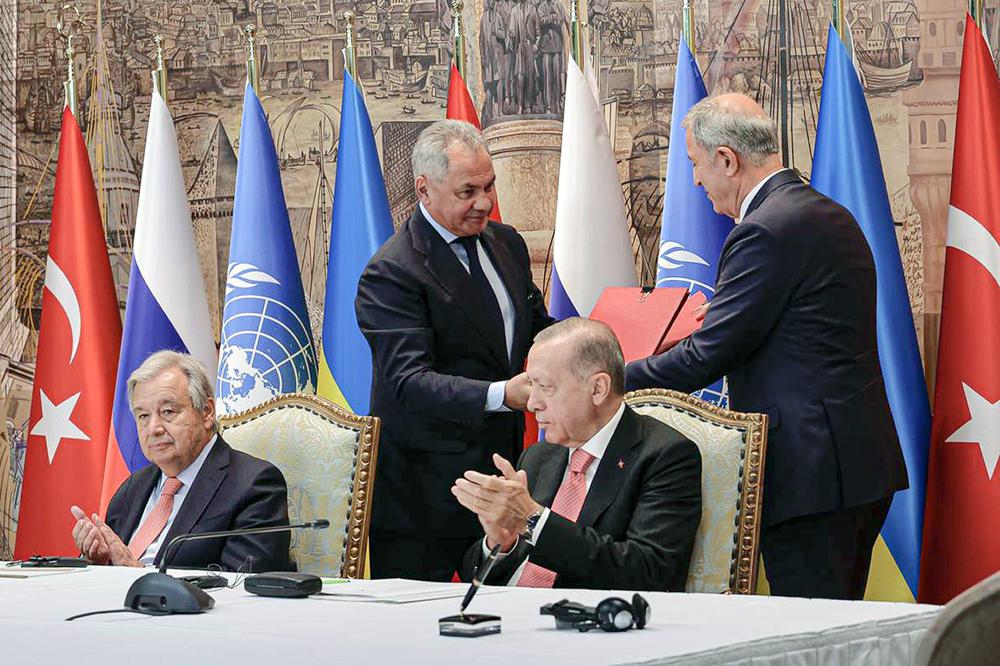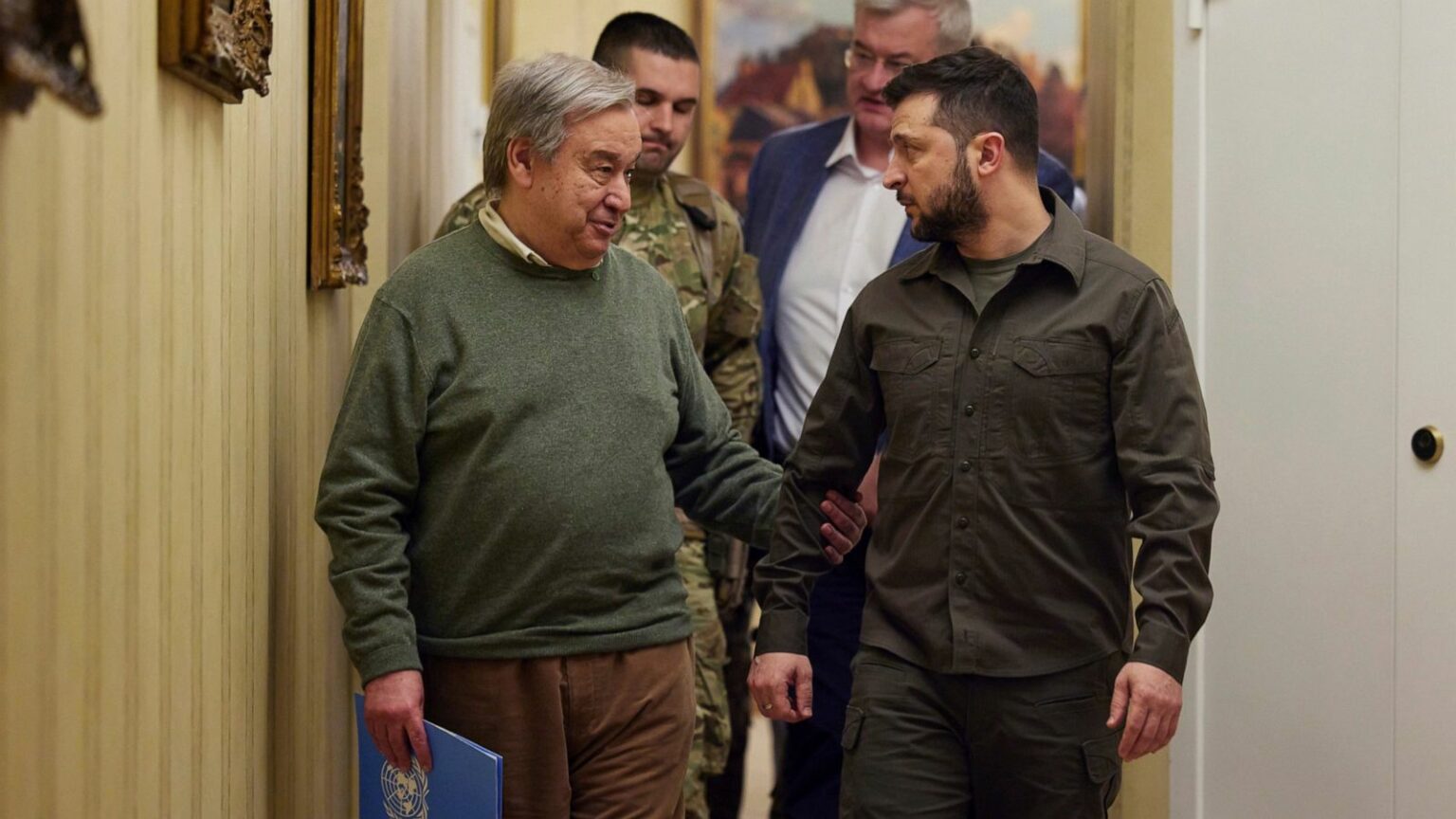By Harsha Josephine Antony | On Thurs 18 Aug 2022 | 9.58 pm IST |
Photo credit: Associated Press

As a potential power broker, Turkish President Recep Tayyip Erdogan will use his first visit to Ukraine since the war began nearly six months ago to seek ways to expand grain exports from Europe’s breadbasket to the world’s needy, while UN Secretary-General António Guterres will focus on containing the volatile situation at a Russian-occupied nuclear power plant. Ukrainian President Volodymyr Zelenskyy is hosting both men in Lviv, far from the front lines, where diplomatic efforts to end the war will be discussed.
Turkish President Recep Tayyip Erdogan, as a potential power broker, will use his first visit to Ukraine since the war began nearly six months ago to seek ways to expand grain exports from Europe’s breadbasket to the world’s needy, while United Nations Secretary-General António Guterres will focus on containing the volatile situation at a Russian-occupied nuclear power plant. Ukrainian President Volodymyr Zelenskyy is hosting both men in the western city of Lviv, far from the front lines, where diplomatic efforts to end the war will also be discussed.
Meanwhile, the screams of incoming shells still drowned out diplomatic whispers. A total of 11 people were killed, and 40 were injured in a series of massive Russian missile strikes on Ukraine’s Kharkiv region on Wednesday night and Thursday morning. According to authorities, the late Wednesday attack on Kharkiv killed at least seven people, injured 20, and damaged residential buildings and civilian infrastructure.
At the same time, the Russian Defense Ministry claimed on Thursday morning that it had targeted “a temporary base of foreign mercenaries” in Kharkiv, killing 90 of them. According to UN spokesman Stephane Dujarric, the three leaders will also discuss the situation at the Russian-controlled Zaporizhzhia nuclear power plant in southern Ukraine, Europe’s largest, which Moscow and Kiev have accused each other of shelling.
In his nightly video address on Wednesday, Zelensky reaffirmed his demand for the Russian military to leave the plant, emphasizing that “only absolute transparency and control of the situation” by international organizations such as the United Nations’ International Atomic Energy Agency could ensure a return to nuclear safety.
Russia emphasized the threat the plant posed during the war. Lt. Gen. Igor Kirillov, commander of the Russian military’s radiological, chemical, and biological protection forces, claimed that Ukrainian troops were planning another strike on the plant on Friday while Guterres was still in Ukraine accusing Russia of nuclear terrorism. Ukraine has categorically denied that it is aiming for the plant.
According to Kirillov, an emergency at the plant could result in “a discharge of radioactive substances into the atmosphere, spreading them hundreds of kilometers away… An emergency of this magnitude will result in mass migration and have far more disastrous consequences than Europe’s looming gas energy crisis.” With such stakes, the role of a go-between, such as Erdogan, could become increasingly important.
Erdogan, whose country is a member of NATO, supporting Ukraine in the conflict, is also in charge of a shaky economy that has become increasingly reliant on Russia for trade. With this backdrop, Thursday’s meetings in Lviv are a diplomatic tightrope walk.
Earlier this month, Turkish President Recep Tayyip Erdogan met with Russian President Vladimir Putin to discuss the same issues. Erdogan and Zelenskyy will meet for an hour in the early afternoon before being joined by Guterres.
Last month, Turkey and the United Nations helped broker an agreement that allowed Ukraine to export 22 million tonnes of corn and other grain stranded in its Black Sea ports since Russia’s invasion on February 24. A separate memorandum signed by Russia and the United Nations aimed at removing impediments to Russian food and fertilizer shipments to global markets.
Because Ukraine and Russia are major suppliers, the war and blocked exports exacerbated the global food crisis significantly. Turkey has the ability to help accelerate exports, which have been reduced to a trickle thus far.
Grain prices peaked following Russia’s invasion, and while some have since returned to prewar levels, they remain significantly higher than before the COVID-19 pandemic. Supply shortages and high prices have disproportionately affected developing countries. Even though ships are now leaving Russia and Ukraine, the food crisis is far from over.
Before his meetings, Guterres visited Ukraine’s oldest university, Ivan Franko National University of Lviv, and praised the role of academic institutions in developing democratic institutions in a brief statement to reporters. He made no comments about the visit’s content. If grain transports and nuclear security are areas where some progress could be made, talks about a comprehensive end to the conflict were not expected to produce anything substantive.
Turkey hosted a round of talks in March between Russian and Ukrainian negotiators, who discussed a possible cease-fire agreement. Following the Istanbul meeting, the talks broke down, with both parties blaming each other.
Erdogan has walked a tightrope between maintaining good relations with Russia and Ukraine. Turkey provided drones to Ukraine, which helped deter a Russian advance early in the conflict. Nonetheless, it has resisted joining Western sanctions against Russia over the dispute.
Turkey increasingly relies on Russia for trade and tourism as it faces a significant economic crisis with official inflation near 80%. Russian gas supplies 45 percent of Turkey’s energy needs, and Russia’s nuclear agency is constructing Turkey’s first nuclear power plant.
During their meeting in Sochi earlier this month, Putin and Erdogan agreed to strengthen energy, financial, and other ties between their countries, raising concerns in the West that Ankara could assist Moscow in evading US and EU sanctions.













